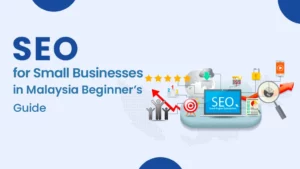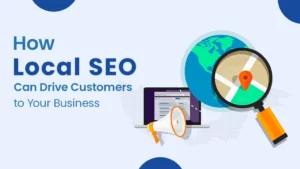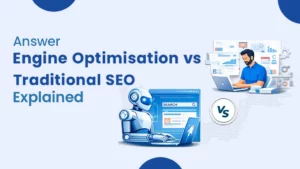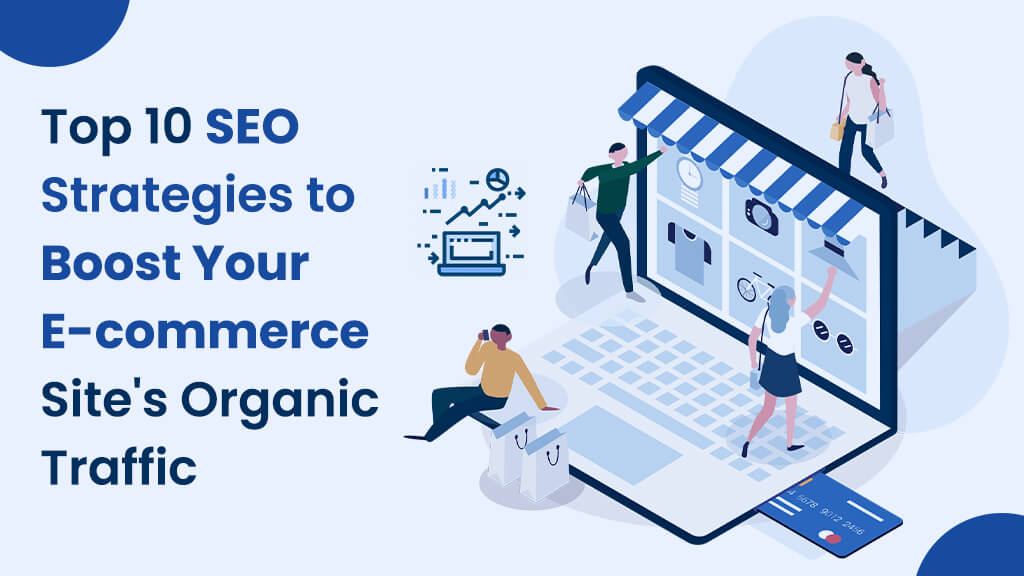If people can’t find you, you are missing out on the point of online shopping. Using good SEO practices and methods will make your website more visible, attract more visitors, and aid you in selling more. In its simplest terms, e-commerce SEO is how you would make your online store easier to find on search engines like Google. That means when somebody is looking for something you sell, you show up toward the top. Now, in this blog, let us discuss exactly what e-commerce SEO is and share the top 10 strategies to boost your e-commerce site’s organic traffic.
What is Ecommerce SEO?

It simply means the visibility of your e-commerce store across search engines. You want customers looking for products like yours to show your website up high in their search results. That may be attained by doing keyword research, on-page optimization, technical SEO, and producing content, among many more strategies. E-commerce SEO services help enhance product pages, category pages, and the structure of your website under the standards prescribed by search engines like Google.
Top 10 Strategies For E-Commerce SEO
1 Keyword Research and Optimization
First, do thorough keyword research to find the words and phrases people use to find products like yours. Then, use these keywords naturally in your product titles, descriptions, meta tags, and throughout your website content. For example, use terms like “ecommerce website optimization” to improve your site’s relevance.
2 Optimize Product Pages
Each product page should be a chance to attract more visitors. Make sure product titles, descriptions, and images have relevant keywords. Include detailed and helpful product descriptions that answer customer questions, and use high-quality images with alt text to help search engines index your pages.
3 Create High-Quality Content
Content marketing is very important for e-commerce SEO. Regularly publish good blog posts, guides, and articles that provide value to your audience. Write about product usage tips, industry news, and buying guides. This helps attract visitors and makes your site an authority in your niche.
4 Improve Site Architecture
A well-structured website makes it easier for search engines to crawl and index your pages. Use a logical hierarchy with categories and subcategories. Make sure every page is easily accessible within a few clicks from the homepage. Use clear and concise URLs that include keywords when appropriate.
5 Optimise for Mobile
Since many people shop using mobile devices, make sure your site is mobile-friendly. Google prioritizes mobile-first indexing, so your website should work well on smartphones and tablets. Optimize your site’s design, load speed, and usability for mobile users.
6 Enhance Page Load Speed
Page load speed is important for both user experience and SEO. Slow-loading pages can lead to higher bounce rates and lower rankings. Use tools like Google PageSpeed Insights to find and fix issues affecting your site’s speed. Compress images, leverage browser caching, and minimize JavaScript to improve load times.
7 Implement Technical SEO Best Practices
Technical SEO involves optimizing the backend structure of your website. Make sure your site is secure (HTTPS), has a valid sitemap, and uses proper schema markup to help search engines understand your content. Regularly check for and fix any broken links or errors that could affect your site’s performance.
8 Utilize Social Proof and Reviews
Customer reviews and testimonials can greatly influence buying decisions and boost your site’s credibility. Encourage satisfied customers to leave reviews on your product pages and use these reviews in your marketing efforts. Positive reviews can also improve your search rankings as they show trustworthiness to search engines.
9 Leverage Backlinks
Building high-quality backlinks from reputable sites can enhance your e-commerce site’s authority and visibility. Reach out to industry influencers, bloggers, and websites to secure guest posts or collaborations. Creating shareable content, such as infographics or expert guides, can also attract valuable backlinks.
10 Monitor and Analyze Performance
Finally, regularly track your SEO performance using tools like Google Analytics and Google Search Console. Analyze key metrics such as organic traffic, bounce rates, and conversion rates to identify areas for improvement. Use this data to refine your SEO strategies and stay ahead of your competitors.
By using these top 10 strategies for e-commerce SEO, you can significantly boost your site’s organic traffic and improve your online presence. Remember, SEO is an ongoing process that requires constant attention and adaptation to changing search engine rules and user behaviors. Investing in professional e-commerce SEO services can provide the expertise and resources needed to stay competitive in the ever-evolving digital marketplace.




